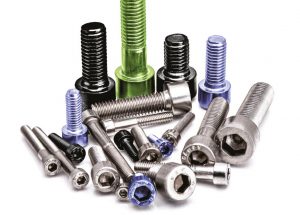Quality is key for any product selection. When it comes to fasteners, quality is defined by durability and resilience. Clients want fasteners that will last! Fasteners can have a variety of coatings, and the application (where and how the fastener will be used) usually dictates which coating makes sense.
Read on to learn about the most popular coatings and their best-use scenarios.

Why is it important to select the right coating?
Because fasteners connect or combine elements, it is essential for structural integrity that the right type is used. Similarly, appropriate coatings ensure the longest lifespan for your fasteners by providing a level of protection for the metal underneath. Exposure to harsh environments or chemicals can shorten a fastener’s lifespan, particularly if not coated appropriately. Damaged or rusted fasteners can be dangerous and are costly to replace. Clearly, it’s important to get the right kind of coating for the job.
Manufacturers rely on results of salt spray testing to know the corrosion resistance of coatings. Basically, the more hours the salt spray can be applied to a coating before oxidation or rust occurs, the better the coating. (Worth noting: Higher corrosion ratings generally correlate with a more expensive product.) If you’d like to know more about these tests,
Types of Fastener Coatings
Stainless Steel
While not a coating (stainless steel is a material), it is the best option for rust prevention because it is inherently corrosion resistant in many environments. That’s why stainless steel is often used in marine, food and medical applications, as well as in products designed for outdoor use.
Brass, Bronze, Chrome or Nickel-Plated
Due to their visually appealing finish, these coatings are often used on fasteners that will be visible (think decorative work). Both brass and bronze are very resistant to corrosion. Chrome and nickel-plated finishes provide some level of corrosion resistance to the metal, but they are typically chosen for their aesthetic finish rather than for strength and protection.
Clear and Yellow Zinc
Zinc is one of the most popular fastener coatings available. This type of coating is relatively inexpensive to apply and protects against rust, making zinc-coated fasteners perfect for humid environments.
Yellow zinc gets its name from its electro-plating process which can create a more golden color than clear zinc coatings. Yellow zinc-coated fasteners are ideal for situations where the product is likely to come in contact with water or other liquids.
Hot Dip Galvanized
Standard zinc plating is popular, but hot-dipped galvanized coatings provide a thicker layer of zinc on the fastener’s surface, making this a better corrosion resistant coating. Also referred to as HD, hot dip galvanized coatings are ideal for outdoor use, particularly coastal areas where the salt content is higher. HD-coated fasteners take a significantly longer time to corrode than those with other coatings.
Electro Galvanized
Known as EG, this type of coating uses a thinner layer of zinc, offering frugal corrosion protection. EG fasteners are typically used in areas where less corrosion protection is needed, such as kitchens and bathrooms. Most fasteners used in roofing are electro galvanized as well.
Grey Phosphate
Grey phosphate is another popular type of coating meant to lengthen fastener lifespan. Phosphate coatings reduce friction, making them great for fasteners that need to be inserted. Phosphate coatings also improve corrosion resistance to a degree. This coating should only be used indoors, and grey phosphate-coated fasteners should not be used with treated lumber.
Ceramic Coated
Ceramic coatings are not as resistant to corrosion as stainless steel, but they are often used in marine applications as they do provide protection against salt water spray. These coatings are often designed to pass 500- and 1,000- hour salt spray tests.
Still Unsure What Fastener Coating To Use?
Each of the coatings listed above is designed to protect fasteners. Clearly, though, the specific application and level of corrosion resistance required dictates which coating is needed. Selecting the wrong coating can negatively affect the performance of your fasteners, so get in touch with an industry expert like those at Global Certified Fasteners when making this choice. Our experienced staff is ready to help you select the right materials for your project. Contact us today!